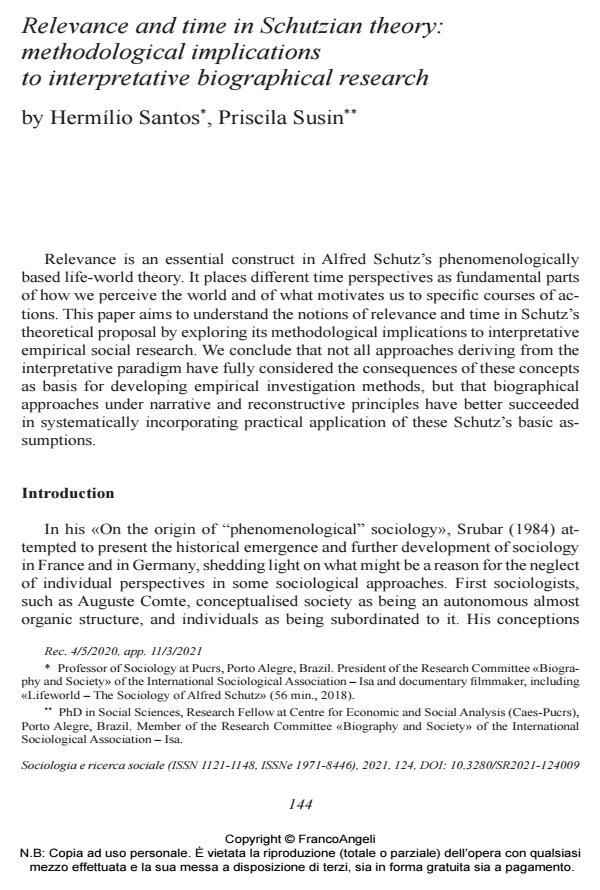Relevance and time in Schutzian theory: methodological implications to interpretative biographical research
Titolo Rivista SOCIOLOGIA E RICERCA SOCIALE
Autori/Curatori Hermílio Santos, Priscila Susin
Anno di pubblicazione 2021 Fascicolo 2021/124 Lingua Inglese
Numero pagine 15 P. 144-158 Dimensione file 178 KB
DOI 10.3280/SR2021-124009
Il DOI è il codice a barre della proprietà intellettuale: per saperne di più
clicca qui
Qui sotto puoi vedere in anteprima la prima pagina di questo articolo.
Se questo articolo ti interessa, lo puoi acquistare (e scaricare in formato pdf) seguendo le facili indicazioni per acquistare il download credit. Acquista Download Credits per scaricare questo Articolo in formato PDF

FrancoAngeli è membro della Publishers International Linking Association, Inc (PILA)associazione indipendente e non profit per facilitare (attraverso i servizi tecnologici implementati da CrossRef.org) l’accesso degli studiosi ai contenuti digitali nelle pubblicazioni professionali e scientifiche
Together with the concept of lifeworld, the concept of relevance plays a central role in the sociology developed by Alfred Schutz. Both concepts are in some way connected to each other, as occurs with most of the concepts he deals with, it means, the exploration of one concept leads necessarily to another one, making the understanding of Schutz’ work sometimes a complex task. The aim of this article is not so much to explore the concept of «relevance» in itself, but rather to scrutinize some implications of this idea for the sociological empirical investigation.
- U. Apitzsch, L. Inowlocki (2002), Biographical Analysis: A «German’ School?», in P. Chamberlayne, J. Bornat, T. Wengraf (eds.), The turn to Biographical Methods in Social Science: Comparative Issues and Examples, London and New York, Routledge.
- M.D. Barber (2004), The Participating Citizen – A Biography of Alfred Schutz, Suny, New York.
- M.D. Barber (2010), Alfred Schutz, in E.N. Zalta (ed.), Stanford Encyclopedia of Philosophy, Stanford (CA), Stanford University P. Berger, T. Luckmann (2004), A construção social da realidade: tratado de sociologia do conhecimento, Petrópolis, Vozes, 24a ed.
- A. Coulon (1995), Etnometodologia, Petrópolis, Vozes.
- S.E. Chase (2005), Narrative Inquiry: Multiple Lenses, Approaches, Voices, in N.K. Denzin, Y.S. Lincoln, The Sage Handbook of Qualitative Research, London, Sage.
- N.K. Denzin, Y.S. Lincoln (2005), The Sage Handbook of Qualitative Research, London, Sage, 3rd ed.
- J. Dreher (2011), Alfred Schutz, in G. Ritzer, J. Stepnisky (ed.), The Wiley-Blackwell Companion to Major Social Theorists, Oxford, Wiley-Blackwell.
- M. Endreß (2005), Introduction, in G. Psathas, M. Endreß, H. Nasu, Hisashi (eds.), Explorations of the Life World: Continuing Dialogues with Alfred Schutz, Dordrecht, Springer.
- M. Endreß, J. Renn (2004), Einleitung der Herausgeber, in A. Schutz, Der sinnhafte Aufbau der sozialen Welt – Eine Einleitung in die verstehende Soziologie, Alfred Schutz Werkausgabe Band II, Konstanz, Uvk.
- W. Fischer-Rosenthal (1995), The Problem with Identity: Biography as Solution to Some (Post)-Modernist Dilemmas, in R. Miller (ed.), Biographical Research Methods, London, Sage Publications, v. II, 2005.
- H. Garfinkel (2002), Studies in Ethnomethodology, Cambridge, Polity Press.
- A. Gurwitsch (2009), The Collected Works of Aron Gurwitsch (1901-1973), vol. II: Studies in Phenomenology and Psychology, New York, Springer.
- S. Hall (2000), A identidade cultural na pós-modernidade, Rio de Janeiro, DP&A Editora.
- J.C. Heritage (1996), Etnometodologia, in A. Giddens, J. Turner (eds.), Teoria Social Hoje, São Paulo, Unesp.
- R. Hitzler (2005), «The Reconstruction of Meaning. Notes on German Interpretive Sociology», Forum Qualitative Sozialforschung/Forum: Qualitative Social Research, 6, 3, -- https://www.qualitative-research.net/index.php/fqs/article/view/7/16.
- R. Hitzler, T. Eberle (2000), Thomas. Phänomenologische Lebensweltanalyse, in U. Flick, E.
- von Kardorffa, I. Steinke (eds.), Qualitative Forschung – Ein Handbuch, Reinbeck bei Hamburg, Rowohlt Verlag.
- M. Kohli (1981), Biography: Account, Text, Method, in R. Miller (ed.), Biographical Research Methods, London, Sage Publications, vol. III, 2005.
- W. Labov, J. Waletzky (2003), Narrative Analysis: Oral Versions of Personal Experience, Seattle, University of Washington Press.
- R. Merton (1970), Sociologia – Teoria e Estrutura, São Paulo, Mestre Jou.
- L. Muzzetto (2006), «Time and Meaning in Alfred Schutz», Time & Society, 15, 1, S.5-31.
- H. Nasu (2008), «A Continuing Dialogue with Alfred Schutz», Human Studies, 31, pp. 87-105.
- M. Natanson (1962), Introduction, in A. Schutz, Collected Papers I: The Problem of Social Reality, Den Haag, Martinus Nijhoff.
- L.M. Pereira (1991), «Relatos orais em ciências sociais: limites e potencial», Revista Anál. & Conj., 6, 3, pp. 109-27.
- G. Psathas (1995), «“Talk and Social Structure” and “Studies of Work”», Human Studies, 18, pp. 139-55.
- G. Rosenthal (1995), Erlebte und erzählte Lebensgeschichte – Gestalt und Struktur biographischer Selbtsbeschreibungen, Frankfurt, Campus Verlag.
- G. Rosenthal (2004), Biographical Research, in C. Seale, G. Cobo, J.F. Gubrium, D. Silverman (eds.), Qualitative Research Practice, London, Sage.
- G. Rosenthal (2006), «The Narrated Life Story: On the Interrelation between Experience, Memory and H. Sacks (1989), Lecture One: Rules of Conversational Sequence», Human Studies, 12, pp. 217-27.
Hermílio Santos, Priscila Susin, Relevance and time in Schutzian theory: methodological implications to interpretative biographical research in "SOCIOLOGIA E RICERCA SOCIALE " 124/2021, pp 144-158, DOI: 10.3280/SR2021-124009